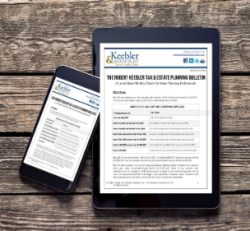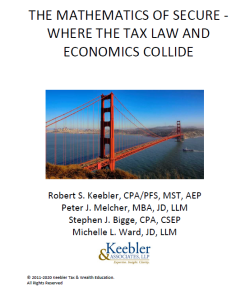
Please check back regularly for an updated listing of all of Bob’s live webinars and conferences. Please follow the links provided for additional details on each event and information on how to register/attend!
May 08, 2024 4:00 PM EST | 5:00 PM EST
Is CCA 202352018 the Most Important IRS Ruling in a Decade?
Some pundits are referring to CCA 202352018 as the most important IRS ruling in a decade, and the reason is crystal clear: if adding a discretionary power allowing the trustee to reimburse the grantor for income taxes now results in a taxable gift, clients who have sold/gifted appreciating assets to grantor trusts could be in significant financial jeopardy because as the value of those assets appreciates, they may not have the cash to pay their income tax bills. At a minimum, this new IRS guidance will have far-reaching implications that will force estate planners and their clients to rethink conventional wisdom regarding the gift tax consequences of amending, modifying and decanting irrevocable trusts.
In their exclusive LISI Webinar, Jonathan Blattmachr, Bob Keebler and Martin Shenkman will carefully review the planning issues raised by this landmark guidance. Here are just a few of the issues they will cover:
·Will decanting assets from an existing irrevocable trust to a new trust in a manner that reduces a beneficiary’s interest in the original trust now result in a taxable gift to the other beneficiaries?
·Can a beneficiary’s continuing interest in a modified trust constitute a non-qualified retained interest for purposes of Section 2702 of the Code? Further, would that beneficiary be treated as having made a taxable gift of his or her entire interest in the trust?
·Could a beneficiary’s failure to object to a proposed trust alteration be treated as equivalent to the beneficiary’s consent to the alteration for purposes of determining if a taxable gift has occurred?
May 09, 2024 2:00 PM EST | 3:00 PM EST
Planning Now For the 2026 CLIFF - Alan Gassman Bob Keebler
What can be done in 2024 to prepare clients for the best decisions in actions both now and in 2025.
May 22, 2024 11:00 AM EST | 12:30 PM EST
Wealth Transfer and Estate Planning Strategies for Clients with Large IRAs: Everything Advisors Need to Master
In his exclusive LISI Webinar, Bob Keebler will cover:
Overview of Key Considerations
- Income, Estate and Gift Taxes
- Generation Skipping Transfer Taxes
- Income §691(c) Deduction and Its Failures
- State Estate Taxes
- State Income Taxes
Overview of SECURE
- 10-Year Rule
- Exception Beneficiaries
Roth Conversions
- The SECURE Act’s ten-year payout rule and the high tax rates to follow
- What the Lawyer needs to know about the strategic aspects of conversions and Estate Planning Benefits
- 2021 Roth Update with Higher Income and Estate Rates
- Critical Roth conversion concepts after SECURE
- Roth conversions for rate arbitrage compared to traditional IRAs to trusts
- 10+ Reasons to convert to a Roth IRA
- Estate tax considerations
- Why a Roth conversion is much better when an estate tax exists
- “Stretch” Roth IRAs for eligible designated beneficiaries
- Roths for SNTs and asset protection trusts
- Using insurance to preserve post-death “stretch-out”
- Why a conversion is a “Bet-to-Live” Strategy and why insurance is a “Bet-to-Die” Strategy
- Easy to read charts, graphs and tables
Charitable Remainder Trust Strategies
- How IRA-CRTs can simulate the longer payout and still benefit charity
- Understand the Mathematics of the IRA-CRT with and without an estate tax
- Understanding the income tax aspects of CRTs
- Converting ordinary income to long-term capital gains
- Designing IRA CRTs for spouses with a 100% marital and charitable estate tax deduction
- Designing IRA CRTs for children and grandchildren including GST issues
- The reasons why the IRA-CRT is a better decision now more than ever and why insurance planning compliments CRT planning
- Running the numbers to compare strategies and why the CRT really works for charitably inclined clients
- Why the 691(c) deduction fails to truly benefit the beneficiaries
Insurance Strategies
- Powerhouse Life Insurance Strategies
- Understand the Income and Estate Tax-Free Benefits of IRA relocation (i.e., utilizing IRA distributions to Purchase Life Insurance)
- Learn Advanced Insurance Strategies Including Policy Designs to Maximize ROI
- Debt financed life insurance strategies
State IRA Income Tax Strategy Trusts
- Which “home” states allow this strategy
- How the SCOTUS opinion in Kaestner may impact this strategy
- How the Minnesota Supreme Court opinion in Fielding impacts this strategy
- How DNI transfers income from a trust to beneficiaries equally
- The throwback rules of California and New York
- Tax treatment of capital gains after IRA withdrawals from both regular and Roth IRAs
Multi-generational Accumulation Trust Sprinkling
- The operation of the DNI Rules of Subchapter J which allow you to shift income
- The 65-Day Rule
- Why 10 years is really 11 tax years
- State law fiduciary accounting income issues
- State income tax issues
- The math of sprinkle trust strategies
- When charities can (in some cases, should?) be added and why
May 22, 2024 11:00 AM EST | 12:30 PM EST
CALIFORNIA’S NEW RETROACTIVE ANTI-INCOMPLETE GIFT TRUST STATUTE - A Special Re-broadcast
In this fast-paced webinar Bob Keebler will present a summary of California’s new fiduciary income tax law requiring incomplete trusts to be taxed in California as a California grantor trust.
This is must-have information for all California, Alaska, Delaware, Nevada, South Dakota and Wyoming trust officers, CPAs and trust and estate lawyers.
Bob will address precisely what the Bill does and solutions, including:
- Overview of prior California law and Federal law.
- Overview of the new statute.
- The election to be treated as a California “nongrantor trust.”
- No free lunch on earlier “throwback years.”
- The use of completed gift trusts to avoid the reach of the California law.
- The use of charitable remainder trusts to defer Federal and California Tax.
- Transferring property from existing INGs to completed gift trusts.
- Selling property from INGs to completed gift trusts via IRC § 453 installment sales.
- Using life insurance and other tax shelter strategies.
- Other ideas to mitigate California’s attempt to checkmate the ING strategy.
<input data-cke-saved-name=”desc2″ name=”desc2″ value=”
In this fast-paced webinar Bob Keebler will present a summary of California’s new fiduciary income tax law requiring incomplete trusts to be taxed in California as a California grantor trust.
This is must-have information for all California, Alaska, Delaware, Nevada, South Dakota and Wyoming trust officers, CPAs and trust and estate lawyers.
Bob will address precisely what the Bill does and solutions, including:
- Overview of prior California law and Federal law.
- Overview of the new statute.
- The election to be treated as a California “nongrantor trust.”
- No free lunch on earlier “throwback years.”
- The use of completed gift trusts to avoid the reach of the California law.
- The use of charitable remainder trusts to defer Federal and California Tax.
- Transferring property from existing INGs to completed gift trusts.
- Selling property from INGs to completed gift trusts via IRC § 453 installment sales.
- Using life insurance and other tax shelter strategies.
- Other ideas to mitigate California’s attempt to checkmate the ING strategy.
May 30, 2024 11:00 AM EST | 12:30 PM EST
Roth Conversions - Updated for 2024
Roth conversions have always had the potential to unlock hidden value. However, 2024 may be an especially effective year to consider a conversion as many marginal tax rate increases seem to be clearly on the horizon along with significant changes to conversion and accumulation rules. Should there be substantial market volatility the timing may be near perfect.
Moreover, SECURE 2.0 expands the impact of Roth conversions beyond a quantitative arbitrage game to a strategic estate planning issue. Therefore, quantitative driven strategies can mitigate the impact of lost deferral and Roth conversions will be the primary tool for most families.
Specifically, this webinar will cover the following topics:
- Low value Roth conversions
- Repaying coronavirus-related distributions to a Roth Account
- Critical Roth conversion concepts after SECURE
- 10+ Reasons to convert to a Roth IRA
- Taxation of Roth IRA conversions and distributions
- Easy to read conversion tables by common scenarios
- Mathematics of Roth IRA conversions
- Timing of Roth IRA conversions to gain tax rate arbitrage
- Estate tax considerations and why a Roth conversion is much better when an estate tax exists
- Hedging Roth conversions with life insurance
- Using insurance to preserve post-death “stretch-out”
May 30, 2024 4:00 PM EST | 5:30 PM EST
Managing Capital Gains in 2024
In this class Bob Keebler will review the following:
- The use of charitable remainder trusts to defer and eliminate capital gains
- The use of 453 installment sales to reduce capital gains and how to elect out of installment sale treatment to accelerate gains into 2025
- The Math of recognizing capital gains in 2024
- Grantor charitable lead trusts to decrease capital gains
- Direct charitable gifts to reduce capital gains
- Opportunity zones to more effectively manage capital gains
- Integrating loss harvesting in an overall capital gains strategy
- Using 1031 exchanges to ease capital gains
- The use of collars, variable forward sales and options to better manage capital gains
- IRC 1259 “choking” collar to trigger capital gains in 2024 or defer to a future date
- “Short against the box” strategies to choose between recognizing gains in 2024 or 2025
In this class Bob Keebler will review the following:
- The use of charitable remainder trusts to defer and eliminate capital gains
- The use of 453 installment sales to reduce capital gains and how to elect out of installment sale treatment to accelerate gains into 2025
- The Math of recognizing capital gains in 2024
- Grantor charitable lead trusts to decrease capital gains
- Direct charitable gifts to reduce capital gains
- Opportunity zones to more effectively manage capital gains
- Integrating loss harvesting in an overall capital gains strategy
- Using 1031 exchanges to ease capital gains
- The use of collars, variable forward sales and options to better manage capital gains
- IRC 1259 “choking” collar to trigger capital gains in 2024 or defer to a future date
- “Short against the box” strategies to choose between recognizing gains in 2024 or 2025
Approximately the third week of the month
The Robert Keebler Tax & Estate Planning Monthly Bulletin
There have been changes in estate, tax, income, and retirement planning laws coming for a while now and it is more imperative than ever for estate planners to stay on top of these changes. Includes: Monthly bulletin sent via e-mail (approximately the third week of the month). Subscribe for $49 per month.
Downloadable E Book
The Secure Act E-Book: “The Mathematics of the SECURE Act: Where Tax Law and Economics Collide”
Most estate planning professionals are already very well aware that the SECURE Act brought with it some of the biggest changes to IRA planning for clients than we have seen during our lifetime. That’s why it’s so important as estate planners that we have what we need to understand the SECURE Act and what you need to know to properly advise your clients.
This is why we, as we have in the past, have teamed up with nationally renowned CPA and IRA expert, Robert S. Keebler, to break it down for you so that you don’t have to do it yourself. Subscribe to the Printable EBook. (Includes: Downloadable, printable PDF e-Book. Pages 108.)

